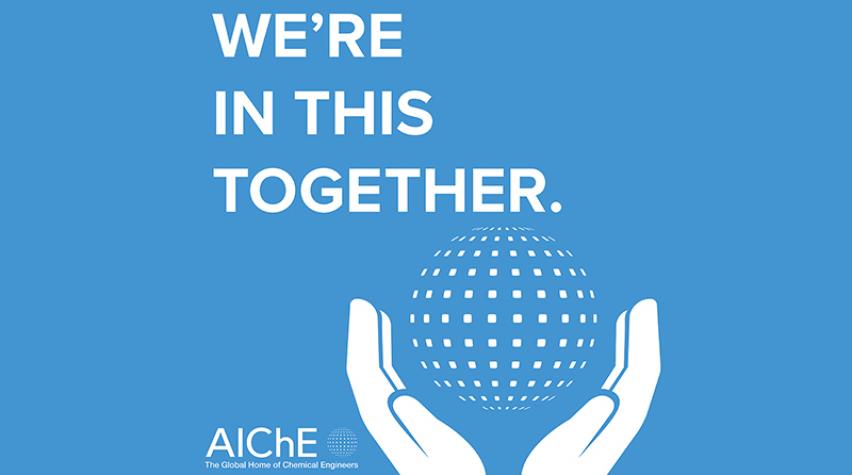
Welcome to AIChE’s What’s Trending feature, where you'll discover some of our most viewed and read content from prior months. We know that many of you have been impacted by the ongoing COVID-19 situation and now, more than ever, it’s important to connect with your network of chemical and related engineers. This has provided us with a reminder that even in uncertain times, AIChE is a diverse community of people who lead, create, inspire, and learn—together.
AIChE is here to help. Knowing that many of our members are working virtually, we have created a page to act as a hub for online content, access to communities, and communication updates. Read more. #WereInThisTogether
Want to be featured in our next AIChE trend report? Make sure to follow us on Facebook, Twitter, Linkedin, and YouTube and use hashtag #AIChEtrends when you share.
Readers' Top Pick: ChEs Tackle COVID-19
The current COVID-19 pandemic has doubtlessly given all of us reason to reflect on many aspects of our lives. I have thought about friends and family and their well-being during this crisis, as well as the little things we all take for granted, like trips to the grocery store or having dinner in a restaurant.
I have also been considering what makes AIChE so special to me. It is each and every one of you — our members, volunteers, leaders, engineers, scientists, researchers, educators, professionals, and the many others who are diligently working to inspire our safe, connected, and inclusive community — all united to meet society’s current challenge, the coronavirus. There are many stories of these valiant efforts. Here are a few I’d like to share with you. Read more.
We Shared: Video Tutorial: Understanding the Purge Process
A purge stream is a portion of a recycle stream that is withdrawn to prevent the buildup of a material that remains entirely in the recycle stream. Not clear on how this works, or how to solve a material balance problem on a system with a purge? Read more.
Free AIChE Academy Access for Professors and Students
To help university professors and students adapt to the expanded need for online learning due to COVID-19, AIChE is providing special access to its Academy courses and webinars.
Professors who are AIChE members can apply to use a broad range of content, free of charge, as a supplement to the courses they're teaching. As for students, a wide range of online content is already free as a part of student membership benefits simply by logging into AIChE Academy, but the new program will also grant them expanded access to additional courses if their professors have received special access. Students should ask their professors for information on how to access these additional courses. Read more.
Surviving Self-Quarantine: Three Tips from an Astronaut
As millions of citizens around the world hunker down in their homes to ride out the COVID-19 pandemic, many struggle with the emotional and physical toll of isolation. When separated from friends, family, and coworkers, it can be difficult not to feel bored, lonely, or restless. Al Sacco, a chemical engineer and astronaut, was isolated in orbit on the International Space Station, and he has some sage advice for those currently sheltering in place. Read more.
We Recognized: Engineering Community Rises to COVID-19 Challenges
AIChE’s social media forums are lighting up with discussions about how chemical engineers are responding to the COVID-19 situation. We’re just beginning to learn about the myriad ways that our community is navigating these rough and uncharted waters — as engineers, philanthropists, and citizens. Engineers across disciplines are inventing ways to produce critically needed medical supplies, in particular, how 3D printing is being engaged to fill the daunting need for personal protective gear and other equipment, such as N95 masks, face shields, hands-free door openers, and ventilator components. Read more.
New Hydrogen Production Method Could Revolutionize Renewable Energy Storage
A new method for splitting water molecules into hydrogen and oxygen may help solve one of the great challenges of renewable power: finding an effective way to store renewable energy for later use. The new method of splitting water molecules is significantly less expensive than those now widely used and could allow producers of wind or solar energy to store energy as hydrogen.
Researchers at Washington State University recognized that current hydrogen production generally relies on expensive catalysts that contain metals such as platinum or iridium. Furthermore, equipment called a proton exchange membrane water electrolyzer, which is used to split water into hydrogen and oxygen, also requires expensive corrosion-resistant metal plates of titanium, due to the highly acidic conditions at which production takes place. Read more.
We Discussed on AIChE Engage
Your top engage discussion was about Latent Heat of Vaporization of Crude Oil.
Join the conversation. Other popular discussions on Engage include:
- M95 mask: sterilize and reuse? Other PPE, too?
- Working Remotely - Share how you're coping
- How ChemEs Can Help with the Shortage of PPE
- Virtual Summer Interns
We Networked
Given the uncertainties related to planning physical conferences, we are reviewing our upcoming conferences and events to determine their timing and if they will be held in-person or virtually. In the meantime, we encourage you to continue to submit abstracts or register for upcoming AIChE events. Please note that we have relaxed our cancellation policy. This means that you can continue to submit abstracts and register for our conferences and events without having to worry about registration fees should you not be able to attend.
Conference recommendations:
- August 16 - 20: 2020 AIChE Spring Meeting and 16th GCPS
- August 17 - 19: Frontiers on Particle Science and Technology
- November 15 - 20: 2020 AIChE Annual Meeting in San Francisco, CA
Stay up to date with AIChE and join the discussion. #AIChEtrends


